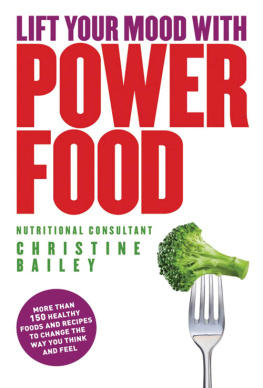Table of Contents
150 Delicious And Healthy Recipes For A Perfect Metabolism
Incl. Nutritional Values And A Large Advice Section
Author: Reagan Brown
content
PREFACE
Dear reader,
I am pleased to pick you up here and guide you through this book. Admittedly, the main part makes up 150 delicious recipes to match the topic; you have to prepare it yourself for better or worse. However, it can be said that the recipes are very varied and vary in difficulty and time required. So there is something for every meal, whether it has to be done quickly or there is a large visitor to the house. Let yourself be inspired and pamper not only your taste buds, but also your body and your health!
The recipe section is preceded by a short and concise chapter on the subject of metabolism. In it you will find answers to your questions, such as: How can I feel more energetic and vital? How do I burn more fat? How do I stimulate the metabolic processes in my body and what does it mean to have a healthy metabolism?
This chapter is processed in an understandable way, since it deals with complex biological chemical processes. Unless you are a specialist, you will still understand everything and make your everyday life easier through better health. In addition, you are guaranteed to feel more comfortable.
I would like to say at this point that this is about a marathon and not a sprint. This book and these recipes are the beginning of a special way of life. It can last a lifetime and when you notice the first changes, I am convinced that you will welcome this way of life. I hope you enjoy reading and trying it out!
Good Appetite!
THE CONCEPT OF METABOLISM
So what is meant by 'metabolism'? The synonymous and scientific term for it scolds itself "metabolism. Ever heard what you have probably heard before is "anabolic steroids" - the substance that is used in bodybuilding or in other situations in which many muscles are desired. What does anabolic steroids have to do with our metabolism? Do you build muscles so quickly when you "boost your metabolism"? Well, apart from the fact that the goal is probably not to build that much muscle, the mechanisms in the cells that are important for building muscle run faster or more smoothly. This means that your regeneration and thus the build-up of muscle mass are accelerated. But fear not, it will all stay in a natural measure and you will not become a Hulk just because you increase your metabolism.
Metabolism is much more than building muscle. It is about processes in the body that take place primarily in your cells and represent degrading (catabolism) or building (anabolism) chains of reactions. Thus, anabolic steroids are a very nice example of an externally supplied substance that influences the metabolism in order to build something up in this case muscles. Overall, it can be said that metabolism is about all processes in the body, be it preparing waste products for disposal or your food and its components (carbohydrates, fats, proteins or amino acids, minerals, vitamins, etc.) in energy, hormones, enzymes or other important substances your body needs to convert. Metabolism is your body's industry and the source of your survival. He ensures that all organs are supplied, that your immune system works and that everything "works", as the saying goes.
These processes take place at the cellular level, which means that we have to look at what is happening in the cells. How do the cells influence each other? Which substances do they produce and which do they give off? What is the effect? For example, these can be hormones that affect the whole body. Therefore, we're not going into the cell explicitly and I'm not telling you the full complexity of the system. After all, it's supposed to be fun. It is enough for you to know that the cells are responsible for your life and your health.
Basically it is about the keyword CONVERSION . The processes in the cells convert the substances you give them into the building blocks that your body needs. This can be an enzyme, a hormone or energy. The conclusion is that this process comes to a standstill when an important substance is missing, which brings us to a balanced and varied diet. Thus, it is absolutely sensible so that all processes regularly receive their components and can continue to work. It can be said that our body is a true artist at converting building blocks into other building blocks. For example, it can produce carbohydrates from amino acids and fats without you having to consume carbohydrates. Amazing, don't you think?
In summary, it can be said that the metabolism (metabolism) conjures up everything that keeps us alive, gives us energy and is good for us daily from what it receives from "outside" and what is available "inside" lets feel. Magic is divided into transformation processes or - more precisely - into building up and breaking down; Anabolism and catabolism. This is the foundation that you need. And already learned something?
THE METABOLIC TYPES IN DETAIL
In the following, we take a closer look at the different types of metabolism. I promised that we wouldn't get any closer to the cell. I would like to keep this promise, which is why I will present these processes in a clear and understandable way without much chemical shop-floor talk.
It can also be said that the individual types of metabolism always have different metabolic pathways, which enables our body to adapt and react flexibly to different environmental stimuli. Enzymes that enable the individual metabolic steps (it is a cascade of metabolic reactions that ultimately form a metabolic pathway) are essential for survival. So: Thanks to our enzymes at the point. Now let's start.
The carbohydrate metabolism
The most important and pristine metabolism that exists in the realm of life is the processing of carbohydrates in the form of glucose - the smallest subunit in most of the carbohydrate sources that we ingest through food. Long-chain sugars (carbohydrates) or other types of sugar, such as fruit sugar (fructose), are also converted into glucose or similar metabolic substances. The most important authority for carbohydrate metabolism processes is the liver. The liver can convert carbohydrates such as fructose, into glucose. It can convert excess glucose into glycogen and convert the still excess glucose into fat. The main function of glucose is to provide energy. 1 g of carbohydrates or 1 g of glucose provides approx. 4 kcal (the energy value that arises when "burning" 1 g of glucose). The main consumer and always the primary target organ of glucose is the brain. If enough glucose is then still available, it is transported to the muscles, which, when exercised, consume energy and obtain this primarily from glucose. The energy gain through glucose can be guaranteed through various metabolic pathways. If more sugar is absorbed from food than is currently being consumed, this excess can be converted into glycogen and then stored primarily in the liver, but also (in certain quantities) in the muscles. If there is still a high excess of glucose, this is converted into fat in the liver and stored in the fat cells. In the event of a glucose deficiency, the liver comes into play again and produces new glucose from protein and fat; this process is called gluconeogenesis and takes place during periods of starvation.
The two most important hormones in the carbohydrate metabolism are insulin and glucagon. Both are antagonists and prove to be extremely influential in the utilization of carbohydrates. In order for glucose to be used, it has to be transported via the blood system from the intestine to the liver or also to the brain, the muscles or other target organs. When it comes to the amount of glucose in the blood, we speak of the blood sugar level. This term is probably familiar to you. If the blood sugar level is high, for example after eating, when the intestine absorbs a lot of sugar, this sugar has to be introduced into the target organs, especially the liver, brain and muscles.














